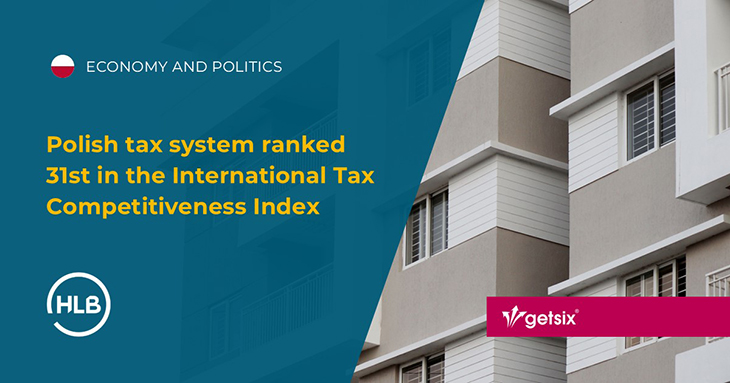Polish tax system ranked 31st in the International Tax Competitiveness Index
Poland’s tax system has ranked 31st in the latest International Tax Competitiveness Index (ITCI), compiled by the American organization Tax Foundation. What contributed to this position, what are the details of the ranking methodology, and what do the results say about Poland’s tax system?
What is the International Tax Competitiveness Index?
The International Tax Competitiveness Index (ITCI) evaluates the tax systems of 38 OECD countries, assessing their competitiveness and neutrality. A well-designed tax system should:
- Facilitate easy calculation and payment of taxes
- Support economic growth
- Not excessively influence economic decisions, such as favoring specific sectors.
The ITCI ranking is based on an analysis of five main areas:
- Corporate income tax (CIT)
- Personal income tax (PIT)
- Consumption taxes
- Property taxes
- International tax rules
Estonia, which has held the top spot for years, stands out for the simplicity and transparency of its tax system. Latvia and Lithuania also rank highly due to their effective reduction of tax barriers for businesses and citizens. At the bottom of the ranking are countries like Portugal, France, and Italy.
Poland – 31st place out of 38 countries
Poland secured the 31st spot, a marginal improvement from last year’s 33rd place. The advancement is attributed to the extensive network of double taxation agreements, signed with 87 countries. These agreements prevent the same income from being taxed in multiple countries, which promotes investment inflows and facilitates international operations for Polish businesses. However, numerous systemic issues, such as complicated procedures and high tax burdens, still keep Poland at the lower end of the ranking.
Weak areas
- Consumption taxes (37th place)
- Property taxes (30th place)
The high standard VAT rate (23%) and numerous exemptions and reduced rates complicate the system and reduce the tax base.
The multi-level taxation of real estate and financial assets, including the bank tax and civil law transaction tax, hinders long-term investments.
Strengths
- Corporate Income Tax (CIT) (12th place)
- Personal Income Tax (PIT) (11th place)
Poland’s relatively low corporate income tax rate (19%) makes it competitive compared to the OECD average (23.9%). However, the complexity of the regulations, including numerous tax reliefs and preferences such as the IP Box and small CIT, remains an issue.
Although the PIT rate in Poland is moderate, high labor costs due to social security and healthcare contributions discourage entrepreneurs and investors. For example, the total cost of employing a worker on the minimum wage is around PLN 5,110, with the worker receiving a net salary of only about PLN 3,222 – the difference stems from various contributions and taxes.
Does Poland need tax reform?
Poland’s low position in the ITCI indicates the need for a tax system reform. Issues such as complicated procedures, high labor costs, and piecemeal changes introducing exemptions for selected groups make the system opaque and difficult to navigate.
The reform should focus on simplifying regulations and increasing tax neutrality. Maintaining the current state discourages entrepreneurs and investors, which, in the long run, may limit Poland’s economic growth.
The full 2024 International Tax Competitiveness Index report is available here.
If you are planning to set up a company in Poland and need assistance with registration procedures or navigating complex tax regulations, we invite you to explore our tax advisory services. We encourage you to contact us – we are happy to help find optimal solutions for your business.
If you have any questions regarding this topic or if you are in need for any additional information – please do not hesitate to contact us:
CUSTOMER RELATIONSHIPS DEPARTMENT

ELŻBIETA NARON
Head of Customer Relationships
Department / Senior Manager
getsix® Group
***





